Paths of Glory (1957)
Directed by: Stanley Kubrick
Written by: Calder Willingham, Jim Thompson, Stanley Kubrick
Starring: Adolphe Menjou, George Macready, Kirk Douglas, Ralph Meeker
USA
AVAILABLE ON BLU-RAY: 19TH SEPTEMBER, from EUREKA ENTERTAINMENT
RUNNING TIME: 88 min
REVIEWED BY: Dr Lenera, Official HCF Critic
World War, 1916. General Georges Broulard asks his subordinate General Mireau to send his division on a borderline suicide mission to take a well-defended German position. Mireau initially refuses, but when Broulard mentions a potential promotion, Mireau quickly convinces himself that the attack will succeed. Despite the protests of Colonel Dax, whom Mireau entrusts with the planning of the attack, and who says that it will result heavy losses for no benefit, the mission goes ahead….and is a failure despite Mireau ordering his artillery to open fire on some soldiers who refuse to leave their trenches for more pointless losses. To deflect blame for this failure, Mireau decides to court martial some of the soldiers for cowardice….
There were times during this film when I felt extremely angry, upset and even wanted to hit the TV screen. This is in no way because of its qualities as a motion picture, which are considerable. No, it was Paths Of Glory’s depiction of the deviousness, the arrogance, the lack of compassion, the lack of responsibility, the nastiness….in fact I’m one step away from saying the evil….of those in charge of those poor men who go out to war, and I’m sure this reaction was entirely what director Stanley Kubrick and his co-writers Jim Thompson and Calder Willingham intended. The film is widely regarded as one of the great anti-war movies, and having now, after all these years, finally seen this gap in my Kubrick education, it’s an opinion I entirely agree with. Sharp and short to the point like Kubrick’s earlier work often is, with not a single wasted shot [not knowing at all its length, I expected, given its weighty subject matter, it to last for at least two hours and instead it ran for under an hour and a half, yet nowhere did I feel it was rushed], it combines pure technical mastery with a powerful story based on truth and containing important themes to create a must-see of a movie. In fact, I’d almost recommend it to a newcomer as their introduction to its often brilliant but sometimes frustrating genius of a director, rather than the better known stuff like 2001: A Space Odyssey.
It was based on a 1935 book written by Humphrey Cobb which retold the true story of four French soldiers executed to set an example to the rest of the troops, something that didn’t just occur in the French army. It was adapted to the stage the same year, and George Stevens wanted to make a film out of it soon after, but was refused. When Kubrick’s The Killing was released in 1956 to unsuccessful box office but considerable critical acclaim, MGM hired him and his producer James B. Harris to develop film stories from MGM’s pile of scripts and purchased novels. Finding nothing they liked, Kubrick recalled reading Cobb’s book years before, though couldn’t get any studio backing until Kirk Douglas read and liked an early script, which must have already foregrounded Colonel Dax unlike the book which had no major character. This persuaded United Artists to back it. Kubrick initially wanted a happier ending to aid the box office but later changed his mind. Harris had to tell studio executive Max E. Youngstein and risk rejection of this change, but simply had the entire final script delivered without a memo of the alteration, on the [correct] assumption that nobody would read it. Production took place entirely in Bavaria, especially Munich’s Schleissheim Palace which had conveniently been bombed in real life. Actor Timothy Carey caused trouble and even faked his own death for publicity, so was fired and replaced by a double for some scenes, while the cold, wet and windy shoot was made worse by Kubrick’s penchant for lots of retakes. One scene required a new roast duck to be prepared almost 68 times. The film just about broke even and its anti-military tone was subject to much criticism and censorship. The US army banned it from being shown in bases, and it wasn’t seen in France, Germany, Switerland and Spain until years later, 11 in Spain’s case.
A very militaristic version of the Marseillaise [French national anthem] ironically plays over the opening title, a narrator quickly sets the scene, and it’s then straight into the story. Kubrick doesn’t take his time like he may have done if this film had been 20 or more years later – no, it gets right on with it, the meeting of General Georges Broulard and General Mireau which sets up the events only taking a few minutes. Initially it seems like Mireau is the main character, and it’s interesting how, initially, he’s not entirely dislikeable. Yes, he may only be keen to carry out Broulard’s instructions once he learns that a promotion is probably in store once he does it, but he certainly earned my respect as a leader who criticises “armchair generals” , bears a visible sign of having been in battles himself, and who goes out into the trenches to meet the men and try to boost their morale….until, in a shocking moment, he says “there’s no such thing as shell-shocked” to a seriously traumatised soldier, slaps him and then orders him to be transferred. From now on, we well and truly hate this guy, though one of the scariest things about the movie is that even when he later attempts to deflect blame for his failures by ordering court martials, he also clearly thinks it’s for the best and for the greater good. Meanwhile Douglas is finally introduced washing topless [which makes a change from him first appearing with his arms round a woman or two], probably as a sop to his fans who won’t see him in this manner again in this film, though he did basically make the film happen so we can forgive him. Much as Broulard got Mireau to agree to his plan, but in a crueller fashion, Mireau gets Dax to commit to this stupid mission by saying he’ll put Dax on leave otherwise – and the action begins.
We have a superb nocturnal sequence which recalls in part Kubrick’s previous film noir work as well as not really being far from the horror movie, especially when flares illuminate scores of dead bodies in what was previously a battleground covered in darkness. It also nicely prefigures later events when a lieutenant shows both his cowardice and stupidity by accidently killing another with a grenade, then retreating to falsify his report. Then it’s the main battle scene, composed largely of fairly long, elegant tracking shots, but still quite intense and about as grim as a scene like this could be given the time it was made in and its ‘A’ [‘PG’] certificate. In fact, I was quite surprised by a quick shot of the still-smoking body of a man killed by a hand grenade with a chunk of his upper arm missing. The sheer chaos is also well evoked and the whole section made me wonder why there haven’t been more [I know there’s been a few, but not many compared to World War 2] really good films about World War 1, especially recently. Trench warfare, in particular, has no much potential for excitement, terror and even irony. The second half of the film details the court martial of three [Mireau’s initial idea was 100] soldiers for cowardice because they didn’t attack the enemy [and as I write, another unusual detail makes itself known in my mind – we never see the German troops], and to set an example. I would imagine everyone watching the film would know the end result, despite the best efforts of Dax who was a top lawyer when he’d been a civilian, but it doesn’t make matters any less gripping, poignant or upsetting. My blood truly boiled during moments like when Dax is not allowed to call any witnesses in a horribly biased trial, or when Mireau calls his men “scum” and claims that he’s: “the only completely innocent man in this whole affair”.
Kubrick and cinematographer Georg Krause give us lots of bravura moments, from Dax walking through the trenches and the constantly moving camera cutting back and forth from his point of view to our point of view looking at him from the front, to a shot of the three condemned soldiers standing in front of a light-filled window, thus making them look like martyrs. The scenes in Schleissheim Palace tend to have light streaming in, because of course Broulard and his kind inhabit a totally different world to the actual soldiers who do their dirty work. Dialogue scenes often have one character right in front of the camera, another further back, and often another further back again, creating an illusion of depth, yet none of this technical brilliance, and some odd handling of moments [not many directors would show the main character giving a speech from a distance] can be deemed technique for the sake of it. It’s always in the service of its story and its attack on incompetent military commanders, and by dint politicians, who don’t give a damn about the hundreds of men they send to their deaths but who care so immensely about themselves, their positions and their reputations that they’ll do anything to avert trouble, even they they caused it in the first place. A bit less successful is some of the dialogue, its fast and often witty nature common in films of this period but not feeling very realistic to me in this setting, though there is some good humour of the blackest kind, notably when two soldiers talk about whether it’ll be better to die from a bayonet or a gun. And at times, having Dax the main character does feel rather forced.
While I still think that Douglas’s greatest performance was in Lust For Life, he’s very impressive here, especially when his character has to carry out orders he clearly disagrees with. His very external style of acting really pays off with his final scene with Broulard where we really feel his anger. Elsewhere, Kubrick generally goes for unconventional, more naturalistic acting types, while Gerard Fried’s score is mostly restricted to drum patterns during the first war scene. It’s not fair to say that I was blown away by Paths Of Glory, because I knew that it would be good, but once again I come away from a Kubrick movie knowing that I’ve experienced something quite special and unique, yet in many ways I’d say that it’s more relatable than much of his other work. As I type, two scenes near the end are stuck in my mind and probably won’t leave it for weeks. Firstly, the three soldiers are visited by the chaplain who tries to comfort them with the words: “Death comes to us all”. For once in a movie, one of the condemned men finds this the complete opposite of comforting and even insulting….and physically attacks the chaplain. And secondly, the final scene – one of the best endings I’ve seen in a movie for a couple of years – which simply astounded me because, while I do admire Kubrick and enjoy all of his movies to varying degrees, I’ve generally found him to be quite a cold director [aside from Spartacus where he was really a hired hand]. I won’t describe it fully, but it involves a group of French soldiers and a German woman [played by Kubrick’s future wife Susan Christian] forced to sing for them, and its purpose is to show Dax – and by extension us – that common humanity still exists despite all the evidence to the contrary we’ve witnessed. I found it moving in a way I can’t really describe. Yep, I cried.
SPECIAL FEATURES
*High-definition digital presentation
*English subtitles for the deaf and hearing impaired
*New audio commentary track by Adrian Martin
*New video interview with Kubrick scholar Peter Kramer
*New video interview with filmmaker Richard Ayoade
*New video interview with Richard Combs
*Original theatrical trailer
*Isolated music & effects track
*PLUS: A booklet featuring the words of Kubrick, and more!
Paths Of Glory comes to Region B’ Blu-ray in an examplary transfer which looks stunning throughout and truly brings out the brilliance of the cinematography, including tons of great little details which probably wouldn’t be noticed on DVD. It’s especially good during the night time war scene, a good example of a scene which can often look less than perfect due to the large amount of black in it, but here looks magnificent….and, of course, without any digital enhancement of any kind. Eureka were obviously unable to obtain any of the material from Criterion’s Region ‘A’ Blu-ray release, but do just about make up for this. There’s three [not two as Eureka initially stated] video interviews about the film. I went straight to Richard Ayaode’s piece as I really like this guy and the movies he’s made so far, but I heard all three and they complement each other by focusing on different aspects of the movie. And, in place of the commentary on the Criterion, we have a different one from Australian critic Adrian Martin. I’ve heard his great talk tracks on Eureka’s releases of Seconds and Fixed Bayonets! and I love listening to this guy. He can go into the most complex observations cabout a film – stuff which I certainly don’t always pick up on – and still be understandable and enjoyable. From the 15 minutes I heard of his Paths Of Glory commentary, he’s right on form. Overall a fine release of a simply essential film!

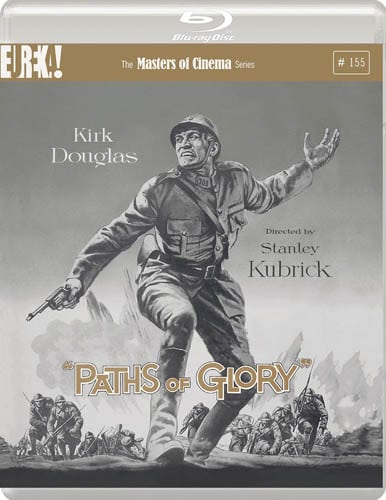
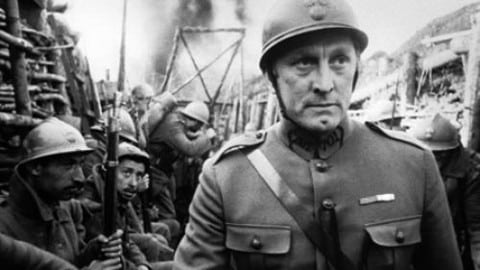
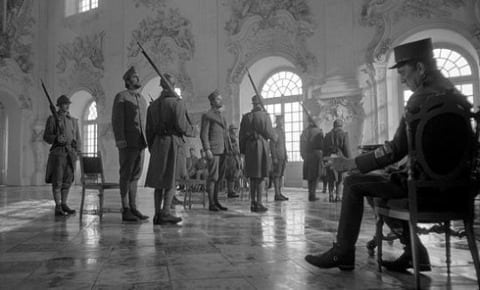



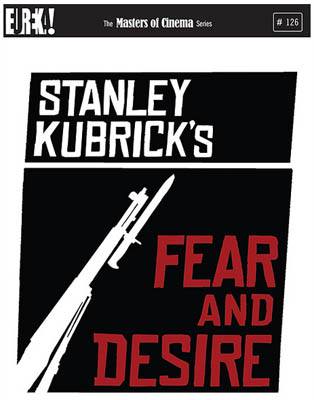
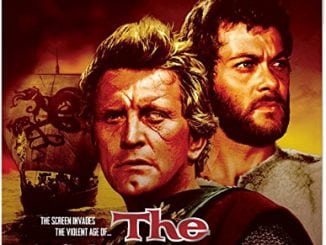
Be the first to comment